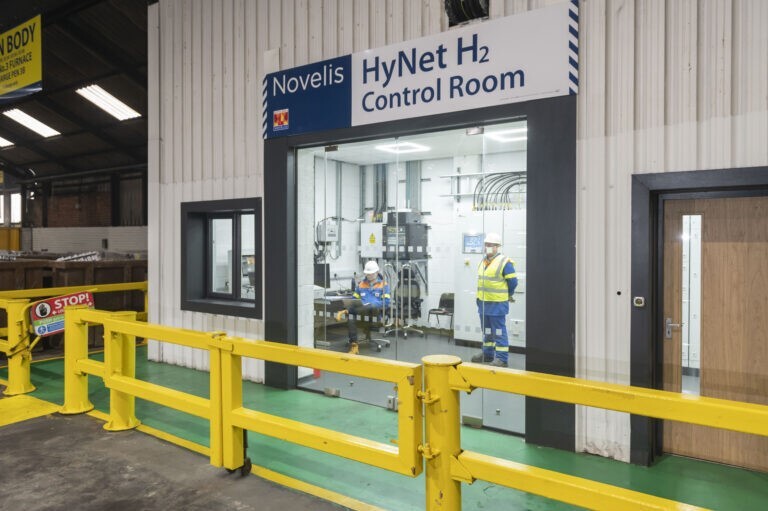您想继续阅读英文文章还
是切换到中文?
是切换到中文?

THINK ALUMINIUM THINK AL CIRCLE

In the race to decarbonise heavy industries, some companies are leaving no stone unturned to find ways that are sustainable and beneficial to the environment. And in this race, one such company which is rewriting the rulebook with innovations is Novelis. Regarded as the global leader in aluminium rolling and recycling, Novelis has successfully carried out the UK’s first industrial-scale hydrogen fuel switching trial at its Latchford plant.

The two-week demonstration, backed by the UK Department for Energy Security & Net Zero’s (DESNZ) £1 billion Net Zero Innovation Portfolio (NZIP) through the Industrial Fuel Switching (IFS) Competition, saw a conventional natural gas furnace successfully adapted to run flexibly on hydrogen.
The trial showed that hydrogen can be safely used in aluminium recycling furnaces, with existing systems adapted smoothly to handle the change. Importantly, the quality of the recycled aluminium remained intact throughout. Dual-fuel burners added flexibility, allowing the furnaces to run just as easily on hydrogen as on natural gas. Developed over two years in collaboration with Progressive Energy, this pioneering project marks a major step forward for the industry.
“This trial has been a major achievement for our team. It demonstrated that we can adapt our existing infrastructure to run on hydrogen without compromising safety, quality, or performance. It’s a practical step forward in reducing our site’s carbon footprint and preparing for a low-carbon future,” said Allan Sweeny, Plant Manager at Novelis Latchford.
Your quick link to the ALuminium recycling updates -World Recycled ALuminium Market Analysis Industry forecast to 2032
Building the foundation for a hydrogen-powered future
The trial also highlighted a critical next step of building the robust infrastructure required for large-scale hydrogen supply and distribution. While mechanisms such as the UK’s Low Carbon Hydrogen Agreement (LCHA) lay an encouraging foundation, achieving full decarbonisation across the North-West will demand extensive transport and storage networks.
With the program’s success, Novelis now has the technical confidence to cut up to 45,000 tonnes of direct CO₂ emissions every year at its Latchford site, provided hydrogen is readily available. Future rollout will hinge on access to the HyNet hydrogen network, slated for 2031, or through on-site electrolytic hydrogen production.
At the same time, Novelis is investing around $90 million to double the plant’s recycling capacity for used beverage cans (UBCs). This expansion will boost throughput by 85 kilotonnes per year, while reducing Novelis Europe’s CO₂e footprint by over 350,000 tonnes annually.
These efforts align with the company’s bold Novelis 3×30 vision, which targets by 2030:
Together with its overarching ambition to achieve carbon neutrality by 2050 or sooner, Novelis is charting a decisive path toward a greener aluminium future.
Bagging top honours at IEA Hydrogen TCP Awards
The company has made history with this pioneering project, proving that the technical feasibility of replacing natural gas with hydrogen in the recycling process, one of the hardest-to-decarbonise industrial sectors.
Novelis’ breakthrough has been recognised on the global stage, winning first place at the IEA Hydrogen TCP Awards of Excellence 2025 in Busan, South Korea. The project stood out among 13 international entries for its pioneering use of hydrogen in one of the hardest industries to decarbonise. This honour not only cements Novelis’ reputation as a leader in industrial innovation but also marks a bold step toward a net-zero future.
The award was presented during the Clean Energy Ministerial (CEM), a high-profile global gathering attended by energy leaders and government representatives from more than 24 nations, including the US, UK, Germany, China, Brazil, South Africa, South Korea, and the European Commission.
The Department for Energy Security and Net Zero
The Department for Energy Security and Net Zero plays a pivotal role in safeguarding the UK’s energy future, ensuring reliable supply, well-functioning markets, and improved efficiency while unlocking the vast opportunities of net zero to position the nation as a leader in the global green economy.
The Novelis–HyNet Industrial Fuel Switching project forms part of the Department’s £1 billion Net Zero Innovation Portfolio, a fund dedicated to advancing low-carbon technologies and systems. By driving down the costs of decarbonisation, the programme is helping accelerate the UK’s journey toward ending its contribution to climate change.
Responses








